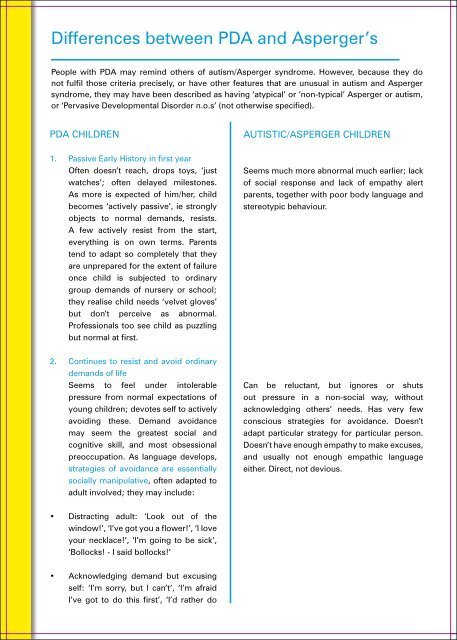PDA_Booklet
PDA_Booklet
PDA_Booklet
You also want an ePaper? Increase the reach of your titles
YUMPU automatically turns print PDFs into web optimized ePapers that Google loves.
Differences between <strong>PDA</strong> and Asperger’s<br />
People with <strong>PDA</strong> may remind others of autism/Asperger syndrome. However, because they do<br />
not fulfil those criteria precisely, or have other features that are unusual in autism and Asperger<br />
syndrome, they may have been described as having ‘atypical’ or ‘non-typical’ Asperger or autism,<br />
or ‘Pervasive Developmental Disorder n.o.s’ (not otherwise specified).<br />
<strong>PDA</strong> CHILDREN<br />
1. Passive Early History in first year<br />
Often doesn’t reach, drops toys, ‘just<br />
watches’; often delayed milestones.<br />
As more is expected of him/her, child<br />
becomes ‘actively passive’, ie strongly<br />
objects to normal demands, resists.<br />
A few actively resist from the start,<br />
everything is on own terms. Parents<br />
tend to adapt so completely that they<br />
are unprepared for the extent of failure<br />
once child is subjected to ordinary<br />
group demands of nursery or school;<br />
they realise child needs ‘velvet gloves’<br />
but don’t perceive as abnormal.<br />
Professionals too see child as puzzling<br />
but normal at first.<br />
2. Continues to resist and avoid ordinary<br />
demands of life<br />
Seems to feel under intolerable<br />
pressure from normal expectations of<br />
young children; devotes self to actively<br />
avoiding these. Demand avoidance<br />
may seem the greatest social and<br />
cognitive skill, and most obsessional<br />
preoccupation. As language develops,<br />
strategies of avoidance are essentially<br />
socially manipulative, often adapted to<br />
adult involved; they may include:<br />
• Distracting adult: ‘Look out of the<br />
window!’, ‘I’ve got you a flower!’, ‘I love<br />
your necklace!’, ‘I’m going to be sick’,<br />
‘Bollocks! - I said bollocks!’<br />
• Acknowledging demand but excusing<br />
self: ‘I’m sorry, but I can’t’, ‘I’m afraid<br />
I’ve got to do this first’, ‘I’d rather do<br />
AUTISTIC/ASPERGER CHILDREN<br />
Seems much more abnormal much earlier; lack<br />
of social response and lack of empathy alert<br />
parents, together with poor body language and<br />
stereotypic behaviour.<br />
Can be reluctant, but ignores or shuts<br />
out pressure in a non-social way, without<br />
acknowledging others’ needs. Has very few<br />
conscious strategies for avoidance. Doesn’t<br />
adapt particular strategy for particular person.<br />
Doesn’t have enough empathy to make excuses,<br />
and usually not enough empathic language<br />
either. Direct, not devious.


